- Home
- Elmore Leonard
LaBrava Page 5
LaBrava Read online
Page 5
“I still don’t like to get drunk,” Cundo Rey said.
“Hey, no, just get feeling good’s all.”
“I got another idea,” Cundo Rey said. “You finished?”
They left the McDonald’s and got in Nobles’ official dark blue star-decorated Plymouth.
“One time I was picked up,” Cundo Rey said, “it was up in Volusia County, strange place, man. I don’t know what I was doing there, making a special delivery, ‘Vette to some guy ran whiskey, I think. Everyone there talk like you.”
Nobles grinned at him. “Sure, that’s close to my neck of the woods. Fact I know several boys ran booze.” He saw Cundo’s shirt unbuttoned, Cundo leaning forward to take it off. “The hell you doing?”
“I was in the jail there, they say plead guilty, man, go to Apalachee for a year, I think was the place they tole me.”
Christ, raising his skinny butt to slip his pants off now. Nobles would look from Cundo to the Federal Highway and back again, moving along north in light traffic. “Apalachee Correctional,” Nobles said, deciding to be cool. “I think it’s for juveniles, but I guess a squirt like you could get sent there.”
“So I tore my clothes off,” Cundo Rey said.
“You did?”
He had his clothes off now, pants and silk shirt, sitting there in skimpy red jockeys as he unfastened his gold chains.
“I told them there were all these little invisible creatures crawling all over me and I screamed and scratched myself enough to bleed.”
“Invisible creatures,” Nobles said, grinning. “Shit.”
“So they sent me up to this place, Chatahoochee, instead. You know where it is?”
“You bet I do. Nuthouse right up there by the Georgia line.”
“Yes, so one night I walked out, stepped across that line to freedom. I’m going to leave my shoes on.”
“I would.” Nobles turned onto Northeast Fourth, let the car coast as it approached the stucco mental health facility up on the left. There were cars at a gas station farther on, but none on the street.
“I’m going to trust you with my jewelry. So don’t sell it.”
“No, I’ll take good care of it. Listen, I ain’t walking in with you bareass.”
“It’s okay, they let me in. A blue notebook, uh?”
Nobles braked gently to a full stop and pointed. “Be in the office that end of the building there.”
“Okay, I’ll call you later,” Cundo Rey said, opening the door.
Nobles said, “Wait a sec. There’s a broad works in there, I think she’s the supervisor. Brown wavy hair, these real long legs, nice high butt. See if you can find out where she lives or if she just works nights or what.”
“Man, you don’t want much, do you?” Cundo Rey got out, slipped off his red briefs and dropped them in through the window. “Hide these . . . where? So I can find them.”
“I’ll put ’em in a paper sack, in the bushes back there where they park. Then you come on over the public beach, nobody’ll think you’re strange.”
“Okay. I see you.”
Jesus. Nobles couldn’t believe it. He watched Cundo walk around past the front of the car—bareass as the day he was born back of some sugarmill, except for his tan socks and white shoes—watched him cross the street and walk up to the mental health place, cheeks of his ass pale moons, lighter than his dusky skin and it surprised Nobles. Look at the son of a bitch, like he was out for a stroll. As Cundo turned half around and waved Nobles mashed the gas pedal and got out of there.
6
* * *
HE FOUND MAURICE IN 304, the guest suite facing the ocean, the room filled with sunlight and old slipcovered furniture. Maurice took the prints without comment, began studying them as he moved toward the closed door to the bedroom. LaBrava came in, followed him part way. He was anxious, but remembered to keep his voice low.
“Why didn’t you tell me who she is?”
“I did tell you.”
“That’s Jean Shaw.”
“I know it’s Jean Shaw. I told you that last night.”
“She’s supposed to be an old friend—you couldn’t even think of her name.”
“I like this one, the expression. She doesn’t know where the hell she is.” Maurice looked up from the prints, eyes wide behind his glasses. “What’re you talking about, I couldn’t think of her name? Twenty years she’s been Jeanie Breen. I told you she left the picture business to marry Jerry Breen, her husband. I remember distinctly telling you that.”
“How is she?”
“Not suffering as much as I hoped.”
“You bring her some breakfast?”
“What do you think this is, a hotel?” Maurice turned to the bedroom, paused and glanced back with his hand on the door. “Wait here.” He went in and all LaBrava saw was the salmon-colored spread hanging off the end of the bed. The door closed again.
Wait. He moved to one of the front windows, stood with his hands resting on the air-conditioning unit. He thought he knew everything there was to know about time. Time as it related to waiting. Waiting on surveillance. Waiting in Mrs. Truman’s living room. But time was doing strange things to him now. Trying to confuse him.
What he saw from the window was timeless, a Florida post card. The strip of park across the street. The palm trees in place, the sea grape. The low wall you could sit on made of coral rock and gray cement. And the beach. What a beach. A desert full of people resting, it was so wide. People out there with blankets and umbrellas. People in the green part of the ocean, before it turned deep blue. People so small they could be from any time. Turn the view around. Sit on the coral wall and look this way at the hotels on Ocean Drive and see back into the thirties. He could look at the hotels, or he could look at Maurice’s photographs all over his apartment, be reminded of pictures in old issues of Life his dad had saved, and feel what it was like to have lived in that time, the decade before he was born, when times were bad but the trend, the look, was to be “modern.”
Now another time frame was presenting pictures, from real life and from memory. A 1950s movie star with dark hair parted in the middle, pale pure skin, black pupils, eyes that stared with cool expressions, knowing something, never smiling except with dark secrets. The pictures brought back feelings from his early teens, when he believed the good guy in the movie was out of his mind to choose the other girl, the sappy one who cried and dried her eyes with her apron, when he could have had Jean Shaw.
There were no sounds from the other room. No warning.
The door opened before he was ready. Maurice came out and a moment later there she was in a navy blue robe, dark hair, the same dark hair parted in the middle though not as long as she used to wear it and he wasn’t prepared. He hadn’t thought of anything to say that would work as a simple act of recognition, acknowledgment.
Maurice was no help. Maurice said, “I’ll be right back,” and walked out, leaving him alone in the same room with Jean Shaw.
She moved past the floral slipcovered sofa to the other front window, not paying any attention to him. Like he wasn’t there. He saw her profile again, the same one, the same slender nose, remembering its delicate outline, the soft, misty profile as she stood at the window in San Francisco staring at the Bay. Foghorn moaning in the background. Deadfall. The guy goes off the bridge in the opening scene and everybody thinks it’s suicide except the guy’s buddy, Robert Mitchum. Robert Mitchum finds out somebody else was on the bridge that night, at the exact same time. A girl . . .
He saw the movie—it had to have been twenty-five years ago, because he was in the ninth grade at Holy Redeemer, he was playing American Legion ball and he went to see the movie downtown after a game, a bunch of them went. She did look older. Not much though. She was still thin and her features, with that clean delicate look, always a little bored, they were the same. He remembered the way she would toss her hair, a gesture, and stare at the guy very calmly, lips slightly parted. Robert Mitchum was no dummy, he grabb
ed her every chance he had in Deadfall, before he ended up with the dead guy’s wife. That was the only trouble with her movies. She was only grabbed once or twice before the good guy went back to Arleen Whalen or Joan Leslie. She would have to be at least fifty. Twelve years older than he was. Or maybe a little more.
He didn’t want to sound dumb. Like the president of a fan club. Miss Shaw, I think I saw every picture you were ever in.
She said, without looking at him, “You don’t happen to have a cigarette, do you?”
It was her voice. Soft but husky, with that relaxed, off-hand tone. A little like Patricia Neal’s voice. Jean Shaw reminded him a little of Patricia Neal, except Jean Shaw was more the mystery-woman type. In movies you saw Jean Shaw at night, hardly ever outside during the day. Jean Shaw could not have played that part in Hud Patricia Neal played. Still, they were somewhat alike.
“I can get you a pack,” LaBrava said. He remembered the way she held a cigarette and the way she would stab it into an ashtray, one stab, and leave it.
“Maury said he’ll bring some. We’ll see.”
“I understand you’re old friends.”
“We were. It remains to be seen if we still are. I don’t know what I’m suppose to do here, besides stare at the ocean.” She came away from the window to the sofa, finally looking at him as she said, “I can do that at home. I think it’s the same ocean I’ve been looking at for the past . . . I don’t know, round it off, say a hundred years.”
Dramatic. But not too. With that soft husky sound, her trademark.
He said, “You were always staring at the ocean in Deadfall. I thought maybe it was like your conscience bothering you. Wondering where the guy was out there, in the water.”
Jean Shaw was seated now, with the Miami Herald on her lap. She brought a pair of round, wire-framed glasses out of the robe and slipped them on. “That was Nightshade.”
“You sound just like her, the part you played.”
“Why wouldn’t I?”
“I think in Deadfall you lured the guy out on the bridge. You were having an affair, then you tried to blackmail him . . . In Nightshade you poisoned your husband.”
She hesitated, looking up at him, and said very slowly, “You know, I think you’re right. Who was the guy in the bridge picture?”
“Robert Mitchum.”
“Yes, you’re right. Mitchum was in Deadfall. Let me think. Gig Young was in Nightshade.”
“He was the insurance investigator,” LaBrava said. “But I think he grew flowers, too, as a hobby.”
“Everybody in the picture grew flowers. The dialogue, at times it sounded like we were reading seed catalogues.” She began looking at the front page of the Herald. Within a few moments her eyes raised to him again.
“You remember those pictures?”
“I bet I’ve seen every picture you were in.” There. It didn’t sound too bad. She was still looking at him.
She said, “Really?” and slipped her glasses off to study him, maybe wondering if he was putting her on. “On television? The late show?”
“No, in movie theaters, the first time.” He didn’t want to get into ages, how old he had been, and said, “Then I saw some of them again later. I’m pretty sure about Deadfall and Nightshade because I saw ’em both in Independence, Missouri, just last year.”
“What were you doing in Independence, Missouri?” With that quiet, easy delivery.
“It’s a long story—I’ll tell you sometime if you want. What I could never figure out was why you never ended up with the guy in the movie, the star.”
She said, “I was the spider woman, why do you think? My role was to come between the lead and the professional virgin. But in the end he goes back to little June Allyson and I say, ‘Swell.’ If I’m not dead.”
“In Deadfall,” LaBrava said, “I remember I kept thinking if I was Robert Mitchum I still would’ve gone for you instead of the guy’s wife, the widow.”
“But I was in on the murder. I lured what’s his name out on the bridge. Was it Tom Drake?”
“It might’ve been. The thing is, your part was always a downer. At least once in a while you should’ve ended up with the star.”
“You can’t have it both ways. I played Woman as Destroyer, and that gave me the lines. And I’d rather have the lines any day than end up with the star.”
“Yeah, I can understand that.”
“Someone said that the character I played never felt for a moment that love could overcome greed. The only time, I think, I was ever in a kitchen was in Nightshade, to make the cookies. You remember the kitchen, the mess? That was the tip-off I’m putting belladonna in the cookie batter. Good wives and virgins keep their kitchens neat.”
“It was a nice touch,” LaBrava said. “I remember he takes the cookies and a glass of milk out to the greenhouse and practically wipes out all of his plants in the death scene, grabbing something to hold onto. Gig Young was good in that. Another one, Obituary, I remember the opening scene was in a cemetery.”
She looked up as he said it and stared at him for a moment. “When did you see Obituary?”
“Long time ago. I remember the opening and I remember, I think Henry Silva was in it, he was your boyfriend.”
She was still watching him. She seemed mildly amazed.
“You were married to a distinguished looking gray-haired guy. I can sorta picture him, but I don’t remember his name.”
“Go on.”
“And I remember—I don’t know if it was that picture or another one—you shot the bad guy. He looks at the blood on his hand, looks down at his shirt. He still can’t believe it. But I don’t remember what it was about. I can’t think who the detective was either, I mean in Obituary. It wasn’t Robert Mitchum, was it?”
She shook her head, thoughtful. “I’m not sure myself who was in it.”
“He seems like a nice guy. Robert Mitchum.”
She said, “I haven’t seen him in years. I think the last time was at Harry Cohn’s funeral.” She paused and said, “Now there was a rotten son of a bitch, Harry Cohn, but I loved him. He ran Columbia. God, did he run it.” She looked up at LaBrava. “I haven’t been interviewed in years, either.”
“Is that what this is like?”
“It reminds me. Sitting in a hotel room in a bathrobe, doing the tour. Harry would advise you how to act. ‘Be polite, don’t say shit, keep your fucking knees together and don’t accept any drink offers from reporters—all they want is to get in your pants.’ Where in the hell is Maurice?”
LaBrava glanced toward the door. “He said he’d be right back.”
There was a silence. He had been in the presence of political celebrities and world figures. He had stood alone, from a few seconds to a few minutes, with Jimmy Carter, Nancy Reagan, George Bush’s wife Barbara, Rosalynn Carter and Amy, not Sadat but Menachem Begin at Camp David, Teddy Kennedy a number of times, nameless Congressmen, Tip O’Neill was one, Fidel Castro in New York, Bob Hope . . . but he had never felt as aware of himself as he did now, in front of Jean Shaw in her blue bathrobe.
“I was trying to think,” LaBrava said, “what your last movie was.”
She looked up from the paper. “Let’s see, I made Let It Ride at Columbia. Went to RKO for one called Moon Dance. A disaster . . .”
“The insane asylum.”
“I quit right after that. I tested for a picture that was shot right around here, a lot of it at the Cardozo Hotel. I thought sure I was going to get the part. Rich widow professional virgin, my first good girl. But they gave it to Eleanor Parker. It didn’t turn out to be that much of a part.”
“Frank Sinatra and Edward G. Robinson,” LaBrava said, impressing the movie star.
She said, “That’s right, A Hole in the Head. Frank Capra, his first picture in I think seven years. I really wanted to work with him. I even came here on my own to find out what rich Miami Beach widows were like.”
“I think you would’ve been too young.”
“That’s why Frank gave it to Eleanor Parker. Before that, half the scripts I read had Jane Greer’s prints all over them.” She said then, “No, the last one wasn’t Moon Dance. I went back to Columbia— oh my God, yeah—to do Treasure of the Aztecs.”
“Treasure of the Aztecs,” LaBrava said, nodding. He had never heard of it.
“Farley Granger was Montezuma’s bastard son. In the last reel I’m about to be offered up to the gods on top of a pyramid, have my heart torn out, but I’m rescued by Cortez’s younger brother. Remember?”
“The star,” LaBrava said. “I can’t think who it was.”
“Audie Murphy. I took the first flight I could get out of Durango and haven’t made a picture since.”
“I imagine a lot of people liked it though.”
“You didn’t see it, did you?”
“I guess that’s one I missed. How many pictures did you make?”
“Sixteen. From ’55 to ’63.”
He could think of four titles. Maybe five. “I might’ve missed a couple of the early ones too,” LaBrava said, “but I saw all the rest. I have to tell you, whether it means anything to you or not, you were good.”
Jean Shaw raised her eyes to his, giving him that cool, familiar look. “Which one was your favorite?”
7
* * *
AT 8:10 P.M. JILL WILKINSON told Pam and Rob, the crisis center night staff, she was getting out before anything else happened. Three consecutive shifts without sleep was about it for hanging in and being a loyal South County employee. She said if she didn’t go home to bed within the next hour, they’d be admitting her to Bethesda Memorial for intensive rehabilitation due to social-service burnout. South County would have to scrounge around for another wide-eyed, dedicated supervisor willing to work a seventy-hour week. Good luck. They didn’t stay wide-eyed long. During the past twenty-four hours:

 Charlie Martz and Other Stories: The Unpublished Stories
Charlie Martz and Other Stories: The Unpublished Stories Elmore Leonard's Western Roundup #2
Elmore Leonard's Western Roundup #2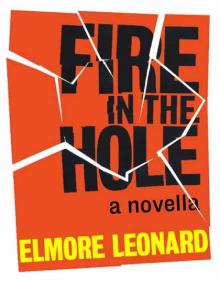 Fire in the Hole
Fire in the Hole Tishomingo Blues (2002)
Tishomingo Blues (2002)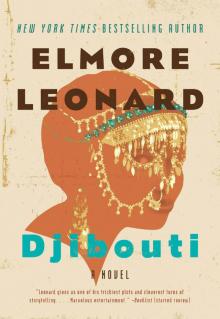 Djibouti
Djibouti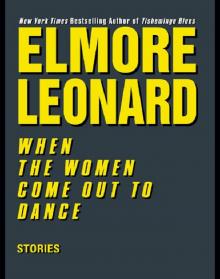 When the Women Come Out to Dance: Stories
When the Women Come Out to Dance: Stories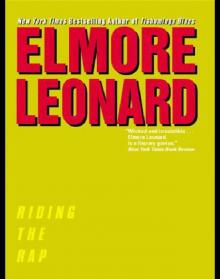 Riding the Rap
Riding the Rap Moment of Vengeance and Other Stories
Moment of Vengeance and Other Stories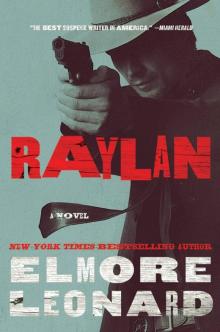 Raylan
Raylan Touch
Touch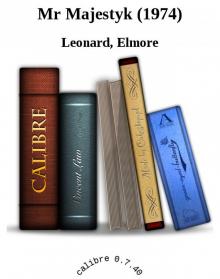 Mr Majestyk
Mr Majestyk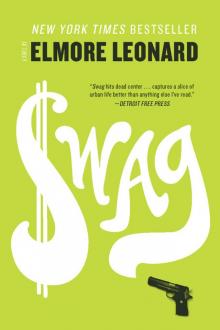 Swag
Swag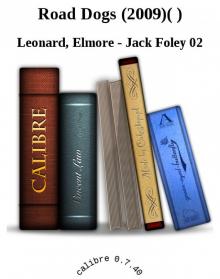 Road Dogs
Road Dogs La Brava
La Brava The Hot Kid
The Hot Kid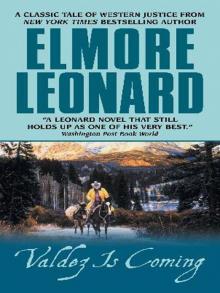 Valdez Is Coming: A Novel
Valdez Is Coming: A Novel Be Cool
Be Cool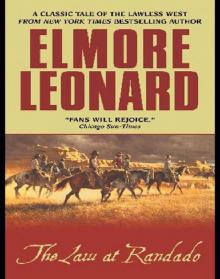 The Law at Randado
The Law at Randado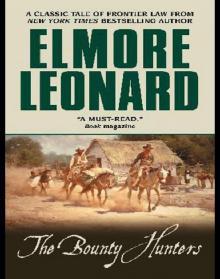 The Bounty Hunters
The Bounty Hunters When the Women Come Out to Dance
When the Women Come Out to Dance 310 to Yuma and Other Stories (1953)
310 to Yuma and Other Stories (1953)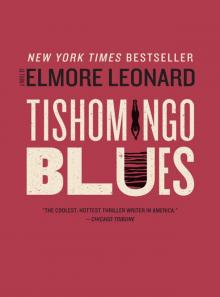 Tishomingo Blues
Tishomingo Blues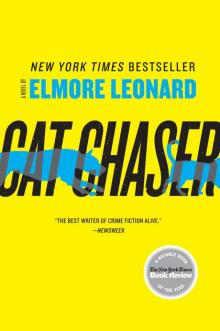 Cat Chaser
Cat Chaser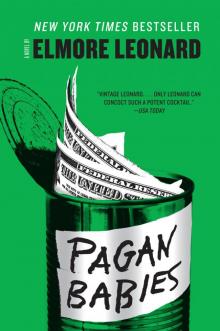 Pagan Babies
Pagan Babies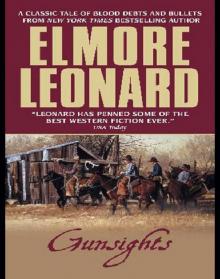 Elmore Leonard's Western Roundup #1
Elmore Leonard's Western Roundup #1 52 Pickup
52 Pickup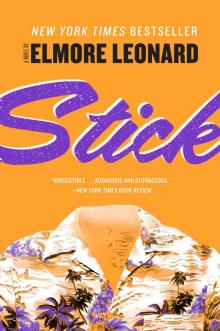 Stick
Stick The Moonshine War
The Moonshine War Valdez Is Coming
Valdez Is Coming City Primeval
City Primeval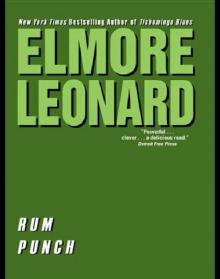 Rum Punch
Rum Punch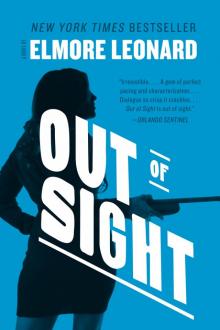 Out of Sight
Out of Sight Naked Came the Manatee (1996)
Naked Came the Manatee (1996)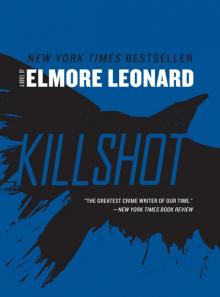 Killshot
Killshot Cuba Libre
Cuba Libre Forty Lashes Less One
Forty Lashes Less One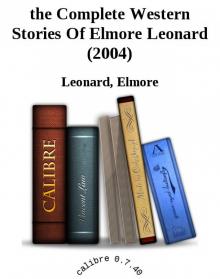 The Complete Western Stories of Elmore Leonard
The Complete Western Stories of Elmore Leonard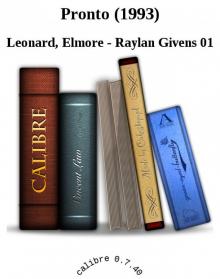 Pronto
Pronto Split Images
Split Images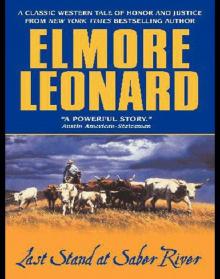 Last Stand at Saber River
Last Stand at Saber River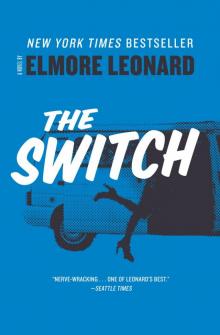 The Switch
The Switch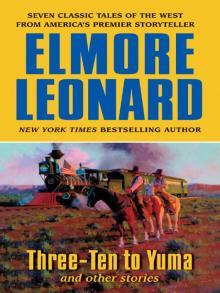 Three-Ten to Yuma and Other Stories
Three-Ten to Yuma and Other Stories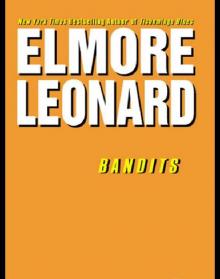 Bandits
Bandits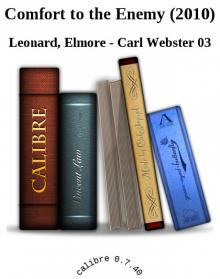 Comfort to the Enemy and Other Carl Webster Stories
Comfort to the Enemy and Other Carl Webster Stories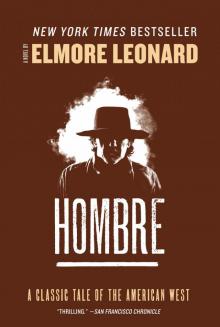 Hombre
Hombre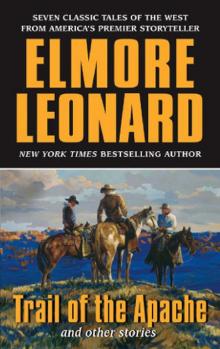 Trail of the Apache and Other Stories
Trail of the Apache and Other Stories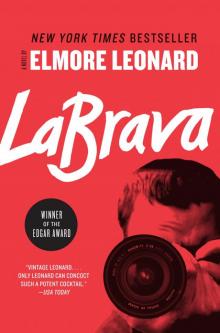 LaBrava
LaBrava Gold Coast
Gold Coast Jackie Brown
Jackie Brown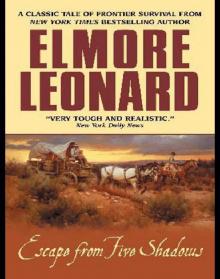 Escape From Five Shadows
Escape From Five Shadows Karen Makes out (1996)
Karen Makes out (1996)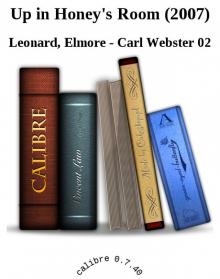 Up in Honey's Room
Up in Honey's Room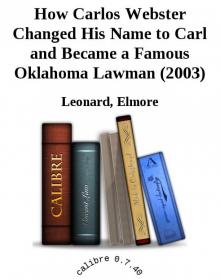 How Carlos Webster Changed His Name to Carl and Became a Famous Oklahoma Lawman (2003)
How Carlos Webster Changed His Name to Carl and Became a Famous Oklahoma Lawman (2003)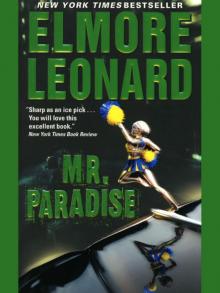 Mr. Paradise
Mr. Paradise The Hunted
The Hunted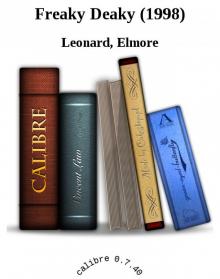 Freaky Deaky
Freaky Deaky Louly and Pretty Boy (Ss)
Louly and Pretty Boy (Ss)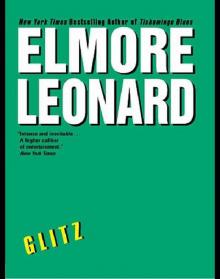 Glitz
Glitz A Coyote's in the House
A Coyote's in the House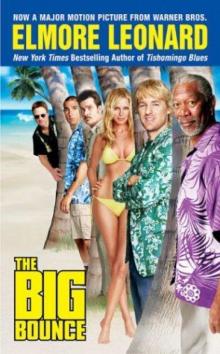 The Big Bounce jr-1
The Big Bounce jr-1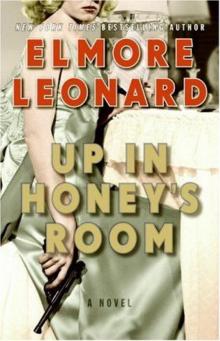 Up in Honey's Room cw-2
Up in Honey's Room cw-2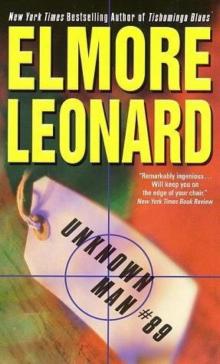 Unknown Man #89 jr-3
Unknown Man #89 jr-3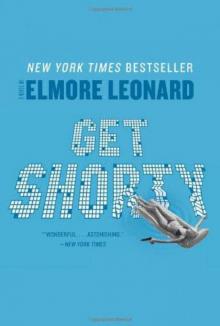 Get Shorty: A Novel cp-1
Get Shorty: A Novel cp-1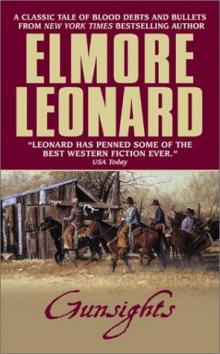 Gunsights
Gunsights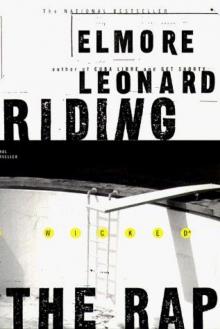 Riding the Rap rg-2
Riding the Rap rg-2